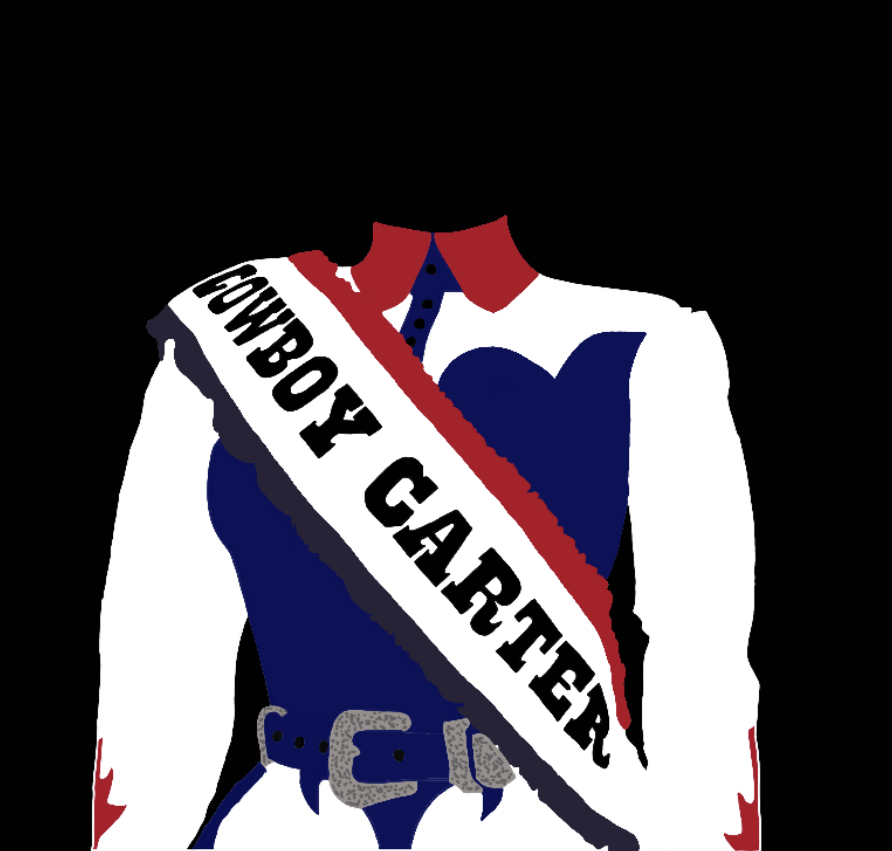“This ain’t a Country album. This is a “Beyoncé” album,” Pop’s most influential star declared 10 days prior to the release of her newest album, “Cowboy Carter.” This latest endeavor, succeeding 2022’s “RENAISSANCE,” tackles the country genre with the inclusion of signature Beyoncé artistry. After all, Knowles-Carter hasn’t been known as one to stay trapped within the limits of pop music.
“This album has been over five years in the making. It was born out of an experience that I had years ago where I did not feel welcomed … and it was very clear that I wasn’t,” the singer-songwriter wrote in a March 19 Instagram post, “The criticisms I faced when I first entered the genre forced me to propel past the limitations that were put on me. act ii is a result of challenging myself, and taking my time to bend and blend genres together to create this body of work.”
This deconstruction of genre endows Cowboy Carter with its most intrinsic “Beyoncé” quality: multidimensionality. Unafraid of samples and interpolation, Knowles-Carter urges her audience to ingest her work and the history that led to its publication within the modern context. Drawing from trailblazing Black artists such as Chuck Berry, up-and-coming Black country artists like Tanner Adell and Brittney Spencer, centuries-old year old arias like “Caro Mio Bien” and iconic female singers such as Patsy Cline, Nancy Sinatra and Dolly Parton, Beyoncé weaves a tapestry of strength, heritage, femininity and independence. Knowles-Carter strives to demonstrate the universality of these values, and therefore her music.
She supports this refusal of categorization in various moments, such as an introductory quip by famed Black country singer Linda Martell in “SPAGHETTII,” teasing the unnecessary limitations falsely drawn by the concept of genre. However, no other refusal is more on-the-nose than that of “AMERIICAN REQUIEM,” the album’s opening track. In the second verse of the song, Knowles-Carter sings: “The grandbaby of a moonshine man / Gadsden, Alabama / Got folk down in Galveston, rooted in Louisiana / Used to say I spoke too country / And the rejection came, said I wasn’t country ‘nough / Said I wouldn’t saddle up, but / If that ain’t country, tell me what is?”
“AMERIICAN REQUIEM” introduces the album’s themes of rejecting stereotypes while also appearing to address the same unwanted experience Knowles-Carter referenced in her Instagram post. Though Knowles-Carter has never linked the events specifically, fans speculate this “rejection” was the backlash faced for her divisive 2016 performance of “Daddy Lessons” at the Country Music Awards with The Chicks. Thousands online were enraged at the duet, claiming that Beyoncé did not represent the genre and so should not be performing on its highest stage. Other commenters argued her invalidity solely because of racism. Co-director of the Black Opry, Tanner Davenport, was present in the audience for the performance and recalled hearing a woman in the row in front of him yell, “Get that black b—ch off the stage.”
“Cowboy Carter” responds to the racialization of country music towards whiteness in the modern day by extracting the core values of the genre and placing them within the context of the multi-racial traditions under which the genre was created. Songs such as “PROTECTOR,” “MY ROSE” and “FLAMENCO” draw upon the beauty, support and strength found within the family unit. Knowles-Carter’s reworking of the Dolly Parton classic, “JOLENE,” stresses the importance of loyalty in relationships. The sprawling story “DAUGHTER” recognizes the importance of nostalgia and storytelling in the creation of a compelling narrative. Co-lead single “16 CARRIAGES” attributes hard work and humility in realizing success. “AMERICAN REQUIIEM” and “YA YA” proclaim Beyoncé’s heritage as distinctly Southern, distinctly American.
These home-grown American themes have roused the support of a nation, placing “Cowboy Carter” in the No. 1 spot on Billboard’s Hot 200 as well as No. 1 on Billboard’s Top Country albums, becoming the first Black woman ever to do so. It is no doubt that within “Cowboy Carter,” Knowles-Carter delivers a successful homage to the pioneers of the past while paving the way for a new, unbounded landscape of music.




